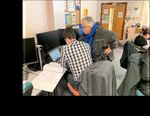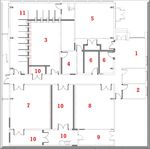First Edition Feast Bites January 2020 - Massey University
←
→
Page content transcription
If your browser does not render page correctly, please read the page content below
First Edition Feast Bites January 2020
Welcome
Welcome to the inaugural Feast newsletter
The Feast team at Massey is growing year on year and
we would like to use our newsletter to share with you
some of the things we have being up to, the courses
we run and progress on our new facilities. The feast
researchers have been busy sharing their work at
In ThisIssue Professor Joanne Hort
international conferences, as well as those close to
Fonterra Riddet Chair home. I have also been occupied in design our new
in Consumer and state of the art facilities which will be complete in 2020.
Welcome
Sensory Science & Please don’t hesitate to get in touch if you want to find
Director of Feast
Introducingthe Feast out more.
Team
Introduction to Sensory
Introducing The Feast Team
Science Courses Rebekah Orr Sensory Dr Saleh Moradi
Science Technician Postdoctoral Fellow
Statistics Courses for Feast
Singapore - New
Zealand Workshop
JessicaSomerton
Understanding Senior Research Maheeka Weerawarna
Chinese Consumers at Officer PhD Candidate in Food
NZIFST 2019 Technology
An Emotional Journey
at Pangborn 2019 Dr Charles Diako
Senior Lecturer in
Jen LarkingFeast
Feast Hosts Sensory Food Product
Administrator
Courses For 2020 Development and
Sensory Science
International
Conference of Food Fionnuala Murphy
Structures, Digestion PhD student studying
and Health 2019 fermented foods. Esther Onguta
Based with Feast and
Feast Joins Social PhD Candidatein
AgResearch Food Technology
Media
International Congress Dr Catriona Hay
on Engineering and Research Assistant for
Food 2019 Feast and the Riddet
Institute Janita Botha
New Future Facing PhD Candidatein
Sensory and Consumer Food Technology
Science Facilities 2020
Dr PeterCannon
Lecturer
School of PsychologyIntroduction to Sensory Science Courses
An Introduction Sensory Evaluation& Evaluating Consumer Response
On Monday 14th & Tuesday 15th of October Professor Joanne Hort from Feast and Dr. Monica
Campbell from Q2 Plus Consultancy held two courses which provided an introduction into sensory
science. The interactive courses were a balance of theory and practical and introduced the
application of sensory evaluation techniques for the food industry and practical sessions to
consider the why, who, what, where and when of consumer product testing.
Statistics Courses
Feast Successfully hosts XLSTAT course at Massey University in Palmerston North
On the 26th and 27th of August Feast hosted this
popular course from Anne Hasted at QI statistics where
12 people attended from across New Zealand.
It was designed to provide confidence in analyzing
and reporting data collected from consumers using
XLSTAT software.
Sessions included a practical workshop where
participants consolidated what they had learnt using
XLSTAT, with suggested solutions to take away with them
for future reference.
Singapore-New Zealand Workshop
How do you feel about eating alternative protein foods? What are the key
research gaps from a consumer perspective?
Our Feast Director Professor Joanne Hort has just
returned from a joint Singapore-New Zealand workshop
to shape future research in this emerging area.
It's clear that we need to learn a lot more about
different consumer groups and their wants and needs
in this space.Understanding Chinese Consumers at NZIFST 2019
Dr Julia Low presents on understanding Chinese consumer perception of food
At this year’s NZIFST conference, I was privileged to give
three oral presentations. One evaluating mixed reality for
understanding consumer response to tea break snacks and
two on understanding Chinese consumer perception of
food, an in particular, fermented dairy products, as part of
our MBIE funded endeavored project with AgResearch.
With consumer demand for chilled and ambient fermented
yogurt milk drinks increasing in China, the study aimed to
understand consumer sensory preference for drinkable
fermented milk among Chinese consumers. Through focus
group interviews in Beijing, we revealed links between
sensory attribute preferences and provenance perception among urban Chinese consumers. Chinese
consumers preferred enhanced levels of sweetness and thickness in drinkable yogurts with a rich
“dairy” flavour. Our approach and findings will help New Zealand dairy companies formulate
drinkable fermented milk products for export markets which meet the in-market sensory drivers and
cultural expectations.
Feast Attends 13th Sensory Science Symposium
Dr Julia Low presents on emotional response to tea break snacks at Pangborn
In July, I had the honour to attend the 13th Pangborn Sensory
Science Symposium in the UK, and gave an oral presentation.
Pangborn, organised by Elsevier (publishers of Food Quality and Preference)
is named after Rose Marie Pangborn who was one of the pioneers in the field,
and is the foremost international conference in the field. The theme this year
was ‘Engage with the Future’ and Professor Joanne Hort was the Chair.
I presented our work on emotion clustering. The study
aimed to determine the effects of context on consumer emotional
response. We looked at emotional response to tea break snacks in
(caramel slice and digestive biscuit) different consumption contexts
– traditional sensory booths, a real café, and a mixed reality projection
of the café. The study revealed that consumers cluster according to
their emotional ratings during tea break snacks consumption. In
particularly, we discovered three different groups with different
emotional response patterns. These groups of consumers have different levels
of emotional engagement especially on the positive side of emotion. For
example, in the larger cluster (59% of participants), certain emotion
categories such as ‘active’ and ‘bored’ were felt significantly less in the booth
context in comparison to the mixed reality café. However, no significant
differences in emotions felt were observed between the café and mixed
reality. Different emotions also discriminated between products in the different
contexts. These findings suggest that clustering consumer emotional response
can be more insightful (and provides additional data about your consumers)
providing more focused analysis on consumer segments.Feast hosts sensory courses for 2020
Back by popular demand! – RVSP to book your space soon
10% discount for additional individuals from the same company
FEAST provides a range of courses at Massey Palmerst North aimed at people in the food and associated
industries. These are equally suited to upskilling, updating or providing a refresher for people in your
company Alternatively we are happy discuss running bespoke courses in-house that can be further
tailored to your needs.
To register please go to our website on the link below:
https://www.massey.ac.nz/massey/learning/colleges/college-of-sciences/clinics-and-services/feast/
training-and-short-courses/training-and-short-courses_home.cfm
International Conference of Food Structures, Digestion
and Health 2019
Maheeka presents her poster on Consumer perception of milkshakes over multiple sips
I’m a 2nd year PhD student working with Prof Jo Hort in FEAST
Lab and Riddet Institute, atMasseyUniversity.
My work looked at the value of combining different sensory
techniques to track the temporal changes in the sensory
profile of a milkshake but over multiple sips as compared to
singe sips which are often the norm in sensory testing. Also we
looked at the effect of sipping method on the temporal
sensory profiles. Initially, we developed a sensory lexicon using
a QDA approach. Panellists rated attribute intensity at the 1st
and last of 8 sips. Then they used TCATA and TDS over all 8
sips. Panellists used sipping from a cup and through a straw for
all QDA, TCATA and TDS evaluations. Each method provided
valuable but different information about the sensory
experience. This study shows that combining techniques with
a trained panel and using multiple sips with relevant sipping
method can provide deeper insights into a consumer’s
product consumption experience.Feast Joins Social Media
LinkedIn Facebook
Feast’s Facebook page is for people who
LinkedIn, is where you will find the latest information
would like to volunteer to participate in our
on all things Feast. From podcasts, sensory courses,
studies.
conferences and more!
International Congress on Engineering and Food 2019
Esther presents her poster on characterising the textural properties of beef
boluses using instrumental techniques through oral processing
I’m a PhD candidate looking at linking beef structure and texture to the chewing behaviour, sensory
properties texture to the chewing behaviour, sensory properties and digestive outcomes. The work I
presented at ICEF13 was about the instrumental techniques that I use to characterise the texture of
beef boluses at various chewing stages. Characterising the bolus texture is a key parameter used to
observe what is going on in the mouth during chewing. We compared two different methods: a
traditional compression test and the slip extrusion test (SET), developed at Massey University, to
determine which method is suitable for capturing these changes.
Subject was asked to chew and expectorate samples at different degrees of chewing including their
natural swallow point. The samples were then tested using both techniques to determine the
instrumental textural properties. We found that the SET was able to capture the changes to bolus
texture as the number of chews increased. The compression test was not as sensitive as it was only able
to differentiate between unchewed and chewed samples.
The SET test will be used for the remainder of m y project to evaluate the instrumental texture properties
of beef boluses. The next steps are to determine whether the fiber orientation in beef influences the
chewing behaviour and the SET will be used to better our understanding of food structure on chewing
behaviour.New future facing sensory and consumer science facilities
Coming to Massey University in2 0 2 0
We're very excited to share the plans for our new Feast facilities which will be ready for use mid 2020.
In addition to traditional ISO standard sensory booths, w e will have two rooms for running focus groups,
panel training, central location tests or training courses. There are cubicles for one to one interviews,
cognitive tests or virtual reality type consumer tests.
Finally, we will have designed facilities to carry out consumer testing in more ecologically valid contexts
with our immersive environment. Here we can introduce props, furniture, aromas, sound etc. and project
videos or photos of different environments onto the walls to fully immerse consumers into the product use
space.
Feast Facilities 2020
We'll update you on progress in the next newsletter, but In the meantime we can still carry out some
of this type of research in our current facilities, so please get in touch if you need some sensory or
consumer work undertaking.
Contact Us:
Food Experience and Sensory Testing Lab (FEAST)
Massey University Private Bag 11222, Palmerston North, New Zealand.
Website: www.massey.ac.nz/feast
Email: feast@massey.ac.nz | LinkedIn: feast@masseyYou can also read



























































